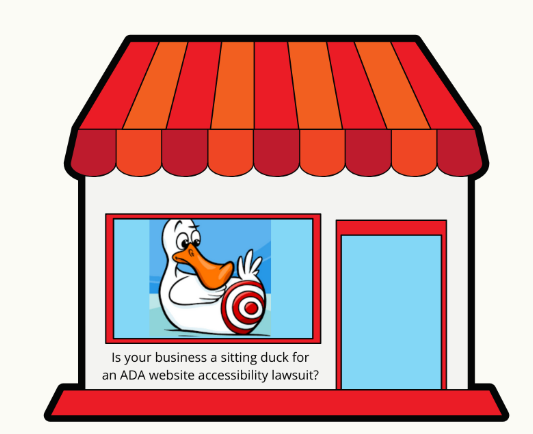ADA website accessibility is mandatory by law. Avoid fines, penalties, and lawsuits. Don't be a sitting duck. Get your website in compliance now. Click here
Website Compliance With ADA
Your Website May Be a Sitting Duck For An ADA Lawsuit?

If your business has a website and you offer goods and services to the public it is mandatory that your website be accessible to blind, deaf, and other disabled persons. You can be sued without notice.
Website compliance with ADA is one of the most vulnerable government compliance requirements that thousands of small, medium and even large businesses currently find themselves facing. Lack of ADA access to websites by disabled persons have risen and are costing businesses millions of dollars to defend against the rising tide of lawsuits.
Recent headlines show the rise and expensive result of failing to have a business's website compliant with the ADA:
- Amazon was recently sued by a blind person who represents a class action of blind persons for lack of the accessibility of its website to blind persons
- Burger King was also hit with a similar class-action lawsuit
- The National Association of the Deaf represented its members against Hulu for lack of access to its website to rent or order movies
- Domino’s Pizza has also been sued for lack of website accessibility because a blind person purchase a pizza while trying to access its website
- The mega entertainer, Beyoncé was also sued because her website was inaccessible to disabled persons wanting to purchase tickets to her concert.
The above lawsuits are highly publicized because they are against large businesses or a famous person. However, there are thousands of small businesses that are vulnerable to the same type lawsuit and they may not be able to afford the costs, attorney fees, and loss of business that come along with the filing and litigation of an ADA access lawsuit.
2019 was another record-breaking year for the filing of ADA lawsuits against businesses for failure to provide access to persons with disabilities. The tide of these lawsuits has been steadily rising over the last several years.
There is an expectation that ADA access compliance lawsuits will continue to rise as more persons with disabilities become aware of their rights under the ADA and the fact that lawyers are actively educating and encouraging accessibility lawsuits to be filed.
Website Compliance with ADA Guidelines Is a Mandatory Law Since 1990
The Americans with Disabilities Act (ADA) has been enacted since 1990. It is a civil rights law that gives any person who believes they have been discriminated against because of their disability the right to file a complaint and seek to enforce the offending business to comply and bring their business into compliance. Many businesses erroneously believe that the ADA only applies to physical buildings. However, courts and the U.S. Department of Justice have determined that websites that promote the sale of goods and services to the public are covered by the legislation as well.

Lack of Website Compliance With ADA Makes Your Business A Sitting Duck for A Lawsuit.
There is no notice required to be given to a business before a person with a disability files a complaint or serves the business with a lawsuit.
Also, lawyers are actively assisting persons with disabilities to seek and find websites that are not in compliance with the law to file claims. The incentive is that attorney’s fees are available to the lawyers for representing ADA claimants.
Also, depending on the state in which the complaint is filed, the disabled person is entitled to money for each time the person has tried to access the business's website and could not. For instance, in California there is a statutory award of $4000 for each time a disabled person has genuinely tried to obtain access to a business’s goods or services and could not.
Your business can be blindsided with a complaint at any time if you don’t have your website in compliance.
Even if you are a very small business without employees, under Title III of the ADA your business is still a sitting duck for a lawsuit under the “public accommodation” regulation the statute if you sell goods and services to the public.
Your Failure to Have Website Compliance with ADA Affects Your Profits and Can Destroy Your Business
Your business reputation is one of the most valuable assets to have. If your website is not ADA accessible, it will affect your reputation.
Complaints about lack of disability access may have an adverse effect if reputation reporting agencies like Yelp and the Better Business Bureau are notified of your site's lack of accessibility to disabled persons.
Not only is your business reputation at stake, but a website that is not accessible to persons with disabilities is also losing out on a 64 million dollar consumer market. This hidden market to most businesses is pent up with desire and demand to make purchases online as well as offline. The total disposable income for persons with disabilities $490 billion annually.
This is a huge market that every business should want to tap into. Your business cannot market this game-changing business opportunity without having an accessible website.

Website Compliance with ADA Is the Right Thing to Do
Our nation is a mixture of different cultures, backgrounds, abilities, and opportunities. It is strongest when everyone in the country that participates in the economy has equal access to goods and services that they want, need, or desire.
Inclusiveness and diversity is not only the right thing to do, but it is also the smart and profitable thing to do.
To ignore and not provide access to 64 million people with 490 billion dollars to spend annually is not a wise business decision. Making sure your website meets ADA access guidelines and opening up another market should be a no brained decision.
Lastly, think about this. At any given moment you too can become part of the disabled community.
According to a disability statistics and facts study about one in seven people aged 35-65 can expect to become disabled for five years or longer. More than 375,000 Americans become disabled every year. You could be in that number.
If your website is not currently ADA compliant, make it happen. It’s the right thing to do.

Tax Credit Reimburse and Tax Deductions to Help Your Businesses' Website Compliance with ADA
The federal government recognizes that making ADA website compliance a legal duty can impose an economic hardship on a small business's cash flow and even its profitability.
To account for such a reality IRS rules have been put into place that reimburses dollar for dollar monies expended to bring a physical facility or a website into ADA access compliance.
Through IRS Code Section 44, Disabled Access Credit, your small business can qualify for a tax credit for increasing website accessibility and making other accommodations to make your business accessible to persons with disabilities.
This particular IRS code provides for a tax credit of up to $5000. This means for every dollar expended to bring your business into compliance you are credited with a dollar off your annual tax bill.
Under IRS Code Section 190 a small business can take up to a $15,000 tax deduction for ADA access compliance. Combined these two IRS code sections provide for $20,000 of tax relief to relieve a small business from the burden and costs of bringing its facility and website into website compliance with the ADA.
These tax incentives help take the burden off of a business for ADA access compliance. It makes good dollars and business sense.
ADA Access Should Be Part of Your Business Strategy for Success
Business strategy is something that changes from time to time to make sure a business is up to date with the latest products and services to maintain a competitive advantage with other businesses within the same industry or category.
Your business should make ADA compliance part of its overall business strategy. Not only it is required by law but by having a strategic plan to reach out and attract persons with disabilities as part of your overall marketing plan is smart, inclusive and can open up an entirely new stream of income.
Businesses that are recognized as inclusive and diverse concerning their outreach, employment, and community involvement have a significant addition to their bottom line as opposed to those that don’t.
Get Your Website Into ADA Compliance Now!
If you have a website and you are selling goods and services or offering anything of value to the public you are required to have an ADA compliant website. It’s the law. Click here to get started.
If you get sued for lack of having an accessible website the cost to defend or settle is between $25,000 and $50,000 if resolved without going to trial. Depending on the circumstances it could be less or more.
However, the cost of an ADA lawsuit is much more than just the settlement of the dollars to the person making the claim. There is the loss of reputation, loss of business and a host of other things any business should avoid and can by just getting its website into compliance